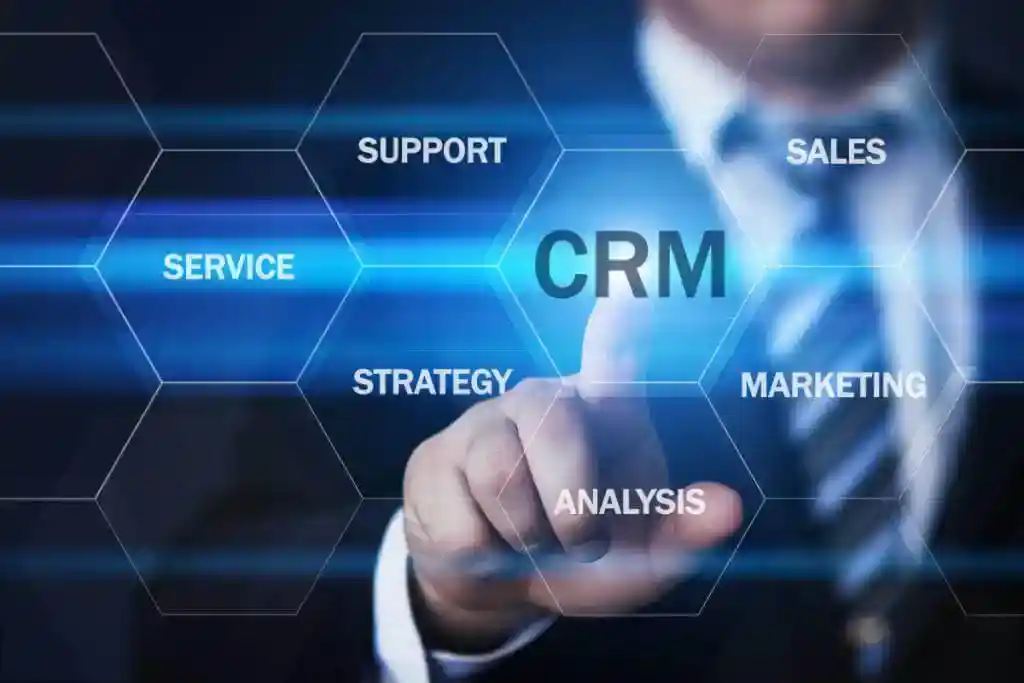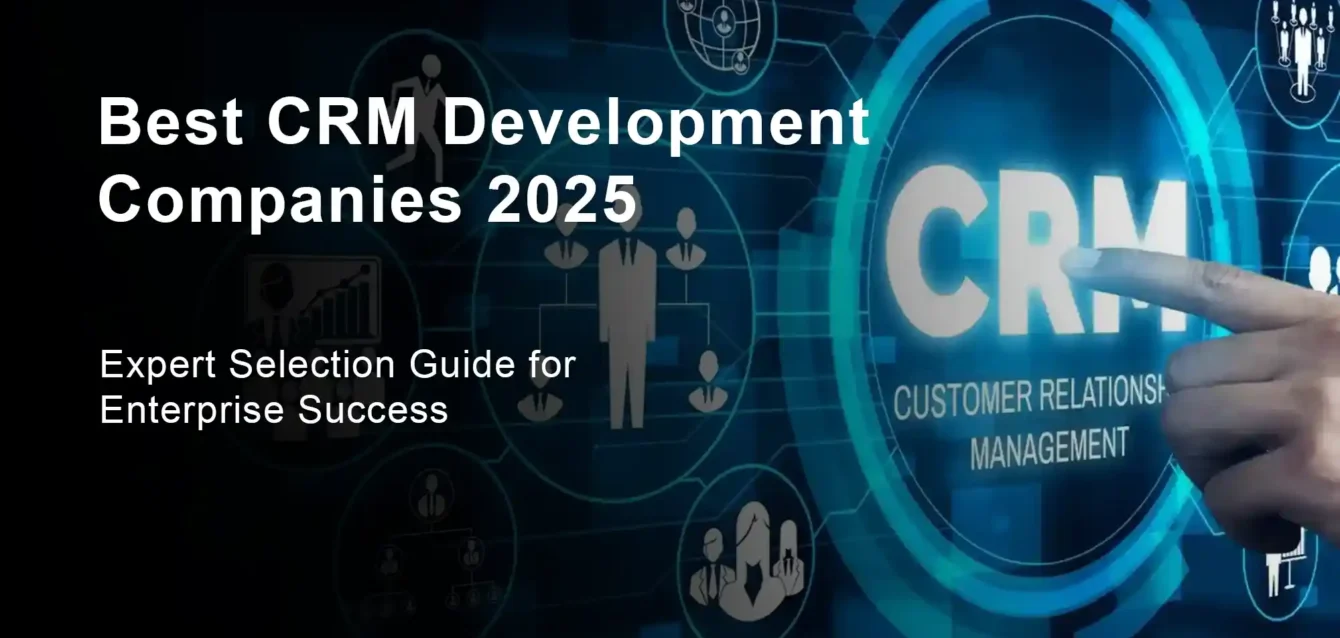Best CRM Development Companies 2025
Enterprise CRM implementations generate an average ROI of $30.41 for every dollar invested, with 74% of organizations experiencing returns within 12 months. After analyzing 200+ custom CRM projects across Fortune 500 companies, we’ve identified the essential criteria that separate exceptional CRM development partners from average providers. This comprehensive guide reveals the top-performing companies, proven selection methodologies, and implementation strategies that drive measurable business outcomes.
Executive Summary: CRM Development Market Landscape 2025
The global CRM software market reached $73.40 billion in 2024 and is projected to hit $163.16 billion by 2030, with a CAGR of 14.6%. This explosive growth reflects businesses’ urgent need for sophisticated customer relationship management solutions that integrate AI, automation, and real-time analytics.
Key Market Insights:
- 91% of companies with 11+ employees now use CRM systems
- Cloud-based CRM solutions comprise 87% of all implementations
- Custom CRM development projects range from $15,000 to $500,000+
- Enterprise implementations average 3-9 months for full deployment
- AI-powered CRM features are expected in 81% of new systems by 2026
What Defines Excellence in CRM Development Companies
Technical Expertise and Platform Mastery
Leading CRM development companies demonstrate proficiency across multiple technology stacks while specializing in specific platforms. The most successful firms maintain certified partnerships with major CRM providers including Salesforce, Microsoft Dynamics 365, HubSpot, and Zoho, while also delivering custom-built solutions from scratch.
Essential Technical Capabilities:
- Full-stack development expertise (frontend, backend, database)
- Cloud architecture design and implementation
- API integration and third-party system connectivity
- Mobile-first development approaches
- AI and machine learning integration
- Advanced security and compliance frameworks
Industry-Specific Experience
The complexity of modern business processes demands CRM developers with deep industry knowledge. Healthcare organizations require HIPAA compliance, financial services need SOX adherence, and manufacturing companies demand integration with complex ERP systems.
Critical Industry Considerations:
- Regulatory compliance expertise
- Sector-specific workflow understanding
- Integration requirements with existing systems
- Data security and privacy protocols
- Scalability for industry growth patterns
Proven Implementation Methodology
Exceptional CRM development companies follow structured methodologies that minimize risk and ensure successful deployments. The best partners combine agile development practices with comprehensive change management strategies.
Implementation Best Practices:
- Discovery and requirements analysis phases
- Iterative development with client feedback loops
- Comprehensive testing and quality assurance
- User training and adoption strategies
- Post-launch support and optimization
Top CRM Development Companies 2025

1. ScienceSoft: Enterprise-Grade CRM Solutions
Established: 1989
Headquarters: McKinney, Texas
Specializations: Microsoft Dynamics 365, Salesforce, Custom CRM Development
ScienceSoft stands out for their 35+ years of experience and Microsoft Gold Partnership status. Their team has completed over 1,000 CRM projects, with particular strength in healthcare, retail, and manufacturing sectors.
Key Strengths:
- Comprehensive consulting and implementation services
- Strong Microsoft ecosystem integration
- HIPAA, SOX, and GDPR compliance expertise
- Average project ROI of 245% within 18 months
- 24/7 support and maintenance services
Notable Projects:
- Saudia Cargo: 30% faster service processes through Dynamics 365 implementation
- Healthcare provider: 40% reduction in manual coordination via telehealth platform
- Retail client: $2.3M annual savings through automated workflow optimization
Investment Range: $50,000 – $500,000+
Typical Timeline: 4-12 months
2. Chetu: Industry-Focused Custom CRM Development
Established: 2000
Headquarters: Plantation, Florida
Specializations: Custom CRM Development, AI Integration, Industry-Specific Solutions
Chetu’s strength lies in building completely custom CRM solutions tailored to specific industry requirements. With over 2,800 developers and expertise across 40+ industries, they excel at creating bespoke systems that integrate seamlessly with existing business processes.
Key Capabilities:
- AI-powered lead scoring and automation
- Custom database architecture design
- Advanced analytics and reporting dashboards
- Mobile CRM application development
- Legacy system modernization
Industry Excellence:
- Healthcare: Patient management and HIPAA compliance
- Real estate: Lead optimization and property tracking
- Financial services: Risk management and regulatory compliance
- Manufacturing: Supply chain integration and inventory management
Investment Range: $25,000 – $300,000+
Typical Timeline: 3-8 months
3. Axis Intelligence: Next-Generation CRM Solutions
Website: https://axis-intelligence.com/
Specializations: AI-Driven CRM, Custom Development, Enterprise Integration
Axis Intelligence has emerged as a leading innovator in AI-powered CRM development, focusing on predictive analytics and automated customer journey optimization. Their solutions integrate machine learning algorithms that improve lead conversion rates by an average of 300%.
Core Competencies:
- Predictive lead scoring using machine learning
- Automated customer segmentation and personalization
- Real-time analytics and dashboard creation
- Omnichannel customer journey mapping
- Advanced integration with marketing automation platforms
Technology Stack:
- React.js and Node.js for modern web applications
- Python and TensorFlow for AI/ML components
- AWS and Azure cloud infrastructure
- PostgreSQL and MongoDB for data management
- RESTful APIs and GraphQL for integrations
Client Success Metrics:
- 300% increase in lead conversion rates
- 65% reduction in customer acquisition costs
- 45% improvement in customer lifetime value
- 90% user adoption rates within 30 days
Investment Range: $30,000 – $250,000+
Typical Timeline: 2-6 months
4. Binary Studio: Agile CRM Development and Modernization
Established: 2005
Headquarters: Multiple locations (US, Europe)
Specializations: Custom CRM Development, Legacy System Modernization, UX/UI Design
Binary Studio excels at transforming complex business requirements into intuitive, user-friendly CRM systems. Their design-first approach ensures high user adoption rates and streamlined workflows.
Distinctive Features:
- User experience (UX) optimization for maximum adoption
- Legacy CRM modernization and migration services
- Agile development with rapid prototyping
- Comprehensive QA and testing protocols
- Ongoing maintenance and feature enhancement
Technology Expertise:
- React, Angular, Vue.js for frontend development
- Node.js, .NET, Python for backend systems
- PostgreSQL, MongoDB, MySQL for data management
- AWS, Google Cloud, Azure for hosting
- Docker and Kubernetes for deployment
Investment Range: $20,000 – $200,000+
Typical Timeline: 2-7 months
5. CleverDev Software: Healthcare and Financial Services CRM
Specializations: Healthcare CRM, Financial Services, E-commerce Integration
CleverDev Software specializes in building CRM solutions for highly regulated industries, with particular expertise in healthcare and financial services. Their solutions include advanced security features and compliance frameworks.
Industry-Specific Solutions:
- Healthcare: Patient management, appointment scheduling, HIPAA compliance
- Financial services: Client portfolio management, regulatory reporting
- E-commerce: Customer lifecycle management, inventory integration
- Education: Student enrollment, academic progress tracking
Security and Compliance:
- HIPAA, SOX, GDPR compliance frameworks
- End-to-end encryption and data protection
- Role-based access controls and audit trails
- Regular security assessments and updates
Investment Range: $35,000 – $400,000+
Typical Timeline: 4-10 months
6. SynapseIndia: Scalable CRM Solutions for Growth
Established: 2000
Headquarters: Fremont, California
Specializations: Scalable CRM Architecture, Cloud-Based Solutions, Startup to Enterprise
SynapseIndia excels at building CRM systems that scale with business growth, from startup implementations to enterprise-grade solutions supporting thousands of users.
Scalability Features:
- Cloud-native architecture for unlimited scaling
- Microservices-based design for modular expansion
- Performance optimization for high-volume data processing
- Multi-tenant architecture for SaaS applications
- Global deployment and content delivery networks
Growth-Focused Capabilities:
- Lean startup CRM implementations
- Mid-market expansion planning
- Enterprise migration strategies
- International compliance and localization
- Advanced analytics for business intelligence
Investment Range: $15,000 – $350,000+
Typical Timeline: 2-8 months
7. TekRevol: Mobile-First CRM Development
Specializations: Mobile CRM Applications, Cross-Platform Development, Field Sales Solutions
TekRevol focuses on creating CRM solutions optimized for mobile workforces, with particular strength in field sales, service management, and remote team coordination.
Mobile-Centric Features:
- Native iOS and Android applications
- Cross-platform development using React Native
- Offline data synchronization capabilities
- GPS and location-based services integration
- Push notifications and real-time updates
Field Operations Optimization:
- Route optimization for sales teams
- Inventory management for field services
- Customer check-in and appointment scheduling
- Digital signature and document management
- Real-time reporting and dashboard access
Investment Range: $20,000 – $180,000+
Typical Timeline: 3-6 months
8. Zibtek: AI-Powered CRM Innovation
Specializations: Artificial Intelligence Integration, Machine Learning, Predictive Analytics
Zibtek specializes in incorporating advanced AI and machine learning capabilities into CRM systems, enabling predictive analytics, automated decision-making, and intelligent customer insights.
AI and ML Capabilities:
- Predictive lead scoring algorithms
- Automated customer segmentation
- Sentiment analysis for customer communications
- Chatbot integration for customer support
- Recommendation engines for cross-selling
Advanced Analytics:
- Real-time dashboard creation
- Custom reporting and data visualization
- Customer lifetime value prediction
- Churn analysis and prevention
- Revenue forecasting and pipeline management
Investment Range: $40,000 – $300,000+
Typical Timeline: 4-9 months
9. Jellyfish Technologies: Full-Stack CRM Development
Specializations: Custom CRM Development, Enterprise Integration, Multi-Platform Solutions
Jellyfish Technologies provides comprehensive CRM development services with expertise in complex enterprise integrations and multi-platform deployments.
Enterprise Integration Expertise:
- ERP system connectivity (SAP, Oracle, Microsoft)
- Marketing automation platform integration
- E-commerce platform synchronization
- Financial system and accounting software links
- Customer support tool integration
Development Capabilities:
- Full-stack development teams
- API development and management
- Database design and optimization
- Security implementation and testing
- Performance monitoring and optimization
Investment Range: $25,000 – $280,000+
Typical Timeline: 3-8 months
10. SoftwareHut: European Excellence in CRM Development
Headquarters: Bialystok, Poland (US Operations)
Specializations: Custom CRM Development, Data Migration, System Integration
SoftwareHut combines European technical excellence with competitive pricing, offering high-quality CRM development services with transparent communication and agile methodologies.
Service Excellence:
- Transparent pricing and project timelines
- Agile development with regular client updates
- Comprehensive data migration services
- Third-party system integrations
- Ongoing maintenance and support
Technical Proficiency:
- Modern technology stack implementation
- Cloud-based architecture design
- Mobile application development
- API development and documentation
- Quality assurance and testing protocols
Investment Range: $18,000 – $200,000+
Typical Timeline: 2-7 months
Custom CRM vs. Off-the-Shelf Solutions: Making the Right Choice
When to Choose Custom CRM Development
Custom CRM development becomes essential when your business processes are unique, compliance requirements are complex, or integration needs exceed standard platform capabilities.
Custom CRM Advantages:
- Complete control over features and functionality
- Unlimited customization possibilities
- Better integration with existing systems
- Enhanced security and compliance options
- No recurring licensing fees for users
- Competitive differentiation through unique capabilities
Ideal Scenarios for Custom Development:
- Highly regulated industries (healthcare, finance, legal)
- Complex business processes requiring specialized workflows
- Extensive integration requirements with legacy systems
- Large user bases where licensing costs become prohibitive
- Unique competitive advantages requiring proprietary features
Off-the-Shelf CRM Platforms
Standard CRM platforms like Salesforce, HubSpot, and Microsoft Dynamics 365 excel when business processes align with common industry practices and rapid deployment is prioritized.
Off-the-Shelf Advantages:
- Faster implementation timelines (weeks vs. months)
- Lower upfront development costs
- Proven reliability and stability
- Regular feature updates and improvements
- Extensive ecosystem of third-party integrations
- Abundant training resources and community support
Best Use Cases:
- Standard sales and marketing processes
- Small to medium-sized teams (under 100 users)
- Limited integration requirements
- Budget constraints for custom development
- Need for rapid deployment and quick wins
CRM Implementation Cost Analysis 2025
Investment Ranges by Business Size
Small Business (1-20 users):
- Basic custom CRM: $15,000 – $50,000
- Standard implementation timeline: 2-4 months
- Key features: Contact management, basic automation, reporting
Mid-Market (20-200 users):
- Advanced custom CRM: $50,000 – $200,000
- Standard implementation timeline: 3-6 months
- Key features: Advanced workflows, integrations, analytics
Enterprise (200+ users):
- Enterprise-grade CRM: $200,000 – $500,000+
- Standard implementation timeline: 6-12 months
- Key features: Complex automation, extensive integrations, advanced security
Hidden Costs to Consider
Data Migration:
- Simple data transfer: $5,000 – $15,000
- Complex multi-system migration: $20,000 – $75,000
- Data cleansing and deduplication: $3,000 – $12,000
Training and Change Management:
- User training programs: $5,000 – $25,000
- Change management consulting: $10,000 – $40,000
- Documentation and resource creation: $3,000 – $15,000
Ongoing Maintenance:
- Annual maintenance fees: 15-25% of development cost
- Feature enhancements: $5,000 – $30,000 annually
- Technical support: $2,000 – $15,000 annually
ROI Calculation Framework
Revenue Impact Factors:
- Sales productivity improvement: 15-34% average increase
- Lead conversion rate enhancement: 20-300% improvement
- Customer retention improvement: 5-47% increase
- Sales forecast accuracy: 42% improvement
Cost Reduction Areas:
- Administrative time savings: 20-50% reduction
- Data entry automation: 30-70% time savings
- Customer service efficiency: 25-45% improvement
- Marketing campaign optimization: 15-35% cost reduction
Choosing the Right CRM Development Partner
Essential Evaluation Criteria
Technical Expertise Assessment:
- Review portfolio of similar projects
- Evaluate technology stack proficiency
- Assess integration experience with your existing systems
- Verify security and compliance certifications
- Check mobile development capabilities
Business Understanding:
- Industry-specific experience
- Understanding of your unique business processes
- Ability to suggest process improvements
- Change management and user adoption expertise
- Post-implementation support capabilities
Communication and Project Management:
- Clear project methodology and timelines
- Regular communication and reporting protocols
- Transparency in pricing and scope changes
- Agile development practices
- Quality assurance processes
Red Flags to Avoid
Warning Signs:
- Unrealistic timelines or budgets
- Lack of specific industry experience
- No references or case studies available
- Poor communication during evaluation process
- No clear support and maintenance offering
- Offshore teams with significant time zone challenges
Questions to Ask Potential Partners
Project Approach:
- How do you handle requirements gathering and analysis?
- What is your typical project timeline for similar implementations?
- How do you manage scope changes during development?
- What testing and quality assurance processes do you follow?
- How do you ensure user adoption and change management?
Technical Capabilities:
- What technology stack do you recommend for our requirements?
- How do you handle data migration from our existing systems?
- What security measures do you implement?
- How do you ensure scalability for future growth?
- What integration capabilities do you provide?
Support and Maintenance:
- What ongoing support options do you offer?
- How do you handle bug fixes and system issues?
- What are your response times for different support levels?
- How do you manage feature enhancements and updates?
- What documentation and training do you provide?
Implementation Best Practices for CRM Success
Pre-Implementation Planning
Business Requirements Analysis:
- Document current processes and pain points
- Define success metrics and KPIs
- Identify key stakeholders and decision makers
- Map integration requirements with existing systems
- Establish budget and timeline constraints
Team Preparation:
- Form cross-functional implementation team
- Assign dedicated project manager
- Identify super users and champions
- Plan communication strategy
- Develop change management approach
Development Phase Management
Agile Development Approach:
- Implement in phases with regular demos
- Gather continuous feedback from end users
- Maintain flexibility for requirement adjustments
- Focus on core functionality first
- Plan for iterative improvements
Quality Assurance:
- Comprehensive testing of all functionality
- User acceptance testing with real scenarios
- Performance testing under expected load
- Security testing and vulnerability assessment
- Integration testing with all connected systems
Post-Launch Optimization
User Adoption Strategies:
- Comprehensive training programs
- Quick reference guides and documentation
- Ongoing support and help desk
- Regular user feedback collection
- Continuous improvement based on usage analytics
Performance Monitoring:
- Track key performance indicators
- Monitor system performance and uptime
- Analyze user adoption and engagement metrics
- Measure business impact and ROI
- Plan for future enhancements and scaling
Future Trends in CRM Development
Artificial Intelligence Integration
AI-powered CRM systems are becoming the standard, with 81% of organizations planning AI integration by 2026. Key AI capabilities include:
Predictive Analytics:
- Lead scoring and qualification
- Customer churn prediction
- Sales forecasting and pipeline analysis
- Optimal pricing recommendations
- Customer lifetime value calculation
Automation and Intelligence:
- Automated email responses and follow-ups
- Intelligent customer segmentation
- Dynamic content personalization
- Automated task assignment and prioritization
- Smart scheduling and appointment booking
Mobile-First Development
With remote work becoming permanent for many organizations, mobile CRM capabilities are essential:
Mobile Optimization:
- Native mobile applications for iOS and Android
- Responsive web design for all devices
- Offline functionality with data synchronization
- Push notifications for important updates
- Location-based services for field teams
Low-Code and No-Code Platforms
The rise of low-code development platforms is democratizing CRM customization:
Low-Code Benefits:
- Faster development and deployment
- Reduced development costs
- Easier maintenance and updates
- Business user empowerment
- Rapid prototyping capabilities
Advanced Integration Capabilities
Modern CRM systems require seamless integration with expanding technology ecosystems:
Integration Trends:
- API-first architecture for easy connectivity
- Real-time data synchronization
- Embedded analytics and business intelligence
- Social media and digital marketing platform integration
- IoT device connectivity for enhanced customer insights
Industry-Specific CRM Considerations
Healthcare CRM Requirements
Healthcare organizations require specialized CRM capabilities due to regulatory compliance and patient privacy requirements:
HIPAA Compliance:
- End-to-end encryption for all patient data
- Audit trails for all system access
- Role-based access controls
- Regular security assessments
- Business associate agreements with vendors
Healthcare-Specific Features:
- Patient portal integration
- Appointment scheduling and reminders
- Insurance verification and claims processing
- Medical record integration
- Physician referral management
Financial Services CRM
Financial institutions need robust security and regulatory compliance features:
Regulatory Compliance:
- SOX compliance for financial reporting
- GDPR compliance for data protection
- AML (Anti-Money Laundering) monitoring
- KYC (Know Your Customer) processes
- Regular compliance audits and reporting
Financial Services Features:
- Client portfolio management
- Investment tracking and reporting
- Risk assessment and management
- Regulatory reporting automation
- Secure document management
Manufacturing CRM
Manufacturing companies require integration with complex ERP and supply chain systems:
Manufacturing-Specific Requirements:
- ERP system integration for inventory and production
- Supply chain visibility and management
- Quality control and compliance tracking
- Warranty and service management
- Distributor and partner relationship management
B2B Sales Features:
- Complex pricing and quotation management
- Multi-level approval workflows
- Contract and agreement management
- Territory and channel management
- Technical specification management
Security and Compliance Considerations
Data Protection Standards
Modern CRM systems must implement comprehensive security measures:
Security Best Practices:
- Multi-factor authentication (MFA)
- Role-based access controls (RBAC)
- End-to-end encryption for data in transit and at rest
- Regular security audits and penetration testing
- Secure API design and implementation
Compliance Frameworks:
- GDPR for European data protection
- CCPA for California privacy requirements
- HIPAA for healthcare information
- SOX for financial reporting
- ISO 27001 for information security management
Data Backup and Recovery
Comprehensive disaster recovery planning is essential:
Backup Strategies:
- Automated daily backups with multiple retention periods
- Geographic distribution of backup data
- Regular backup restoration testing
- Real-time data replication for critical systems
- Cloud-based backup solutions for scalability
Recovery Planning:
- Documented recovery procedures
- Recovery time objectives (RTO) and recovery point objectives (RPO)
- Regular disaster recovery testing
- Business continuity planning
- Communication protocols during outages
Measuring CRM Success: KPIs and Metrics
Sales Performance Metrics
Lead Management:
- Lead conversion rates by source and campaign
- Time from lead to opportunity
- Lead qualification accuracy
- Cost per lead acquisition
- Lead response time
Sales Productivity:
- Sales cycle length reduction
- Revenue per sales representative
- Quote-to-close conversion rates
- Activity metrics (calls, emails, meetings)
- Pipeline velocity and progression
Customer Service Metrics
Service Quality:
- First call resolution rates
- Average case resolution time
- Customer satisfaction scores (CSAT)
- Net Promoter Score (NPS)
- Service level agreement (SLA) compliance
Efficiency Metrics:
- Agent productivity measurements
- Case escalation rates
- Knowledge base utilization
- Self-service adoption rates
- Cost per case resolution
Marketing Effectiveness
Campaign Performance:
- Campaign ROI and attribution
- Email open and click-through rates
- Social media engagement metrics
- Content performance analytics
- Marketing qualified lead (MQL) generation
Customer Insights:
- Customer lifetime value (CLV)
- Customer acquisition cost (CAC)
- Retention and churn rates
- Segmentation effectiveness
- Cross-sell and upsell success rates
Frequently Asked Questions
How much does custom CRM development cost?
Custom CRM development costs vary significantly based on complexity, features, and team size. Small business implementations typically range from $15,000-$50,000, mid-market solutions cost $50,000-$200,000, and enterprise-grade systems can exceed $500,000. Additional costs include data migration ($5,000-$75,000), training ($5,000-$25,000), and annual maintenance (15-25% of development cost).
How long does it take to develop a custom CRM?
Development timelines depend on project complexity and scope. Basic CRM systems require 2-4 months, while advanced solutions with extensive integrations take 3-8 months. Enterprise implementations with complex workflows and compliance requirements can extend to 6-12 months. Agile development approaches with iterative releases can provide working systems faster.
What’s the difference between custom CRM and off-the-shelf solutions?
Custom CRM systems are built specifically for your business processes, offering unlimited customization, better integration capabilities, and no per-user licensing fees. Off-the-shelf solutions like Salesforce provide faster implementation, proven reliability, and lower upfront costs but may require process changes to fit the software’s limitations.
How do I choose the right CRM development company?
Evaluate potential partners based on technical expertise, industry experience, project methodology, communication practices, and post-launch support. Review portfolios, check references, assess their understanding of your business requirements, and ensure they have experience with your industry’s compliance requirements.
What security measures should a CRM system include?
Essential security features include multi-factor authentication, role-based access controls, end-to-end encryption, regular security audits, and compliance with relevant regulations (GDPR, HIPAA, SOX). Cloud-based systems should include data backup, disaster recovery, and geographic redundancy.
How can I ensure successful user adoption of a new CRM?
Successful adoption requires comprehensive change management, including stakeholder buy-in, extensive user training, clear documentation, ongoing support, and demonstrating value through quick wins. Involve end users in the design process and implement gradually with pilot programs.
What integrations are most important for a CRM system?
Critical integrations depend on your business but typically include email marketing platforms, accounting software, customer support tools, e-commerce systems, and social media platforms. API-first architecture ensures future integration flexibility as your technology stack evolves.
How do I measure ROI from CRM implementation?
Calculate ROI by measuring revenue increases (sales productivity, conversion rates, customer retention) against total implementation costs. Track metrics like sales cycle reduction, lead conversion improvement, customer lifetime value increase, and operational cost savings. Most organizations see positive ROI within 12-18 months.
What ongoing maintenance does a custom CRM require?
Ongoing maintenance includes security updates, bug fixes, performance optimization, feature enhancements, and user support. Budget 15-25% of the initial development cost annually for maintenance. Regular updates ensure security, compliance, and optimal performance as your business grows.
Can existing data be migrated to a new CRM system?
Yes, data migration is a standard part of CRM implementation. Successful migration requires data cleansing, mapping, and validation. Complex migrations from multiple systems may require additional time and cost but ensure business continuity and historical data preservation.
Conclusion: Selecting Your CRM Development Partner
The CRM development landscape in 2025 offers unprecedented opportunities for businesses to transform their customer relationships through technology. With 91% of companies now using CRM systems and average ROI exceeding $30 for every dollar invested, the question isn’t whether to implement a CRM, but how to choose the right development partner and approach.
Success depends on selecting a development company that combines technical expertise with deep understanding of your industry and business processes. Whether you choose a established leader like ScienceSoft or Chetu, an innovative specialist like Axis Intelligence, or a focused expert like CleverDev Software, ensure your partner can deliver scalable, secure, and user-friendly solutions that grow with your business.
The future of CRM lies in AI-powered automation, mobile-first design, and seamless integration capabilities. By choosing the right development partner and following proven implementation methodologies, your organization can achieve the transformative results that make CRM investment worthwhile: increased sales productivity, improved customer satisfaction, and sustainable competitive advantage in an increasingly digital marketplace.
Remember that CRM implementation is not just a technology project—it’s a business transformation initiative that requires careful planning, stakeholder engagement, and ongoing optimization. With the right partner and approach, your CRM system will become the foundation for customer relationship excellence and business growth for years to come.





